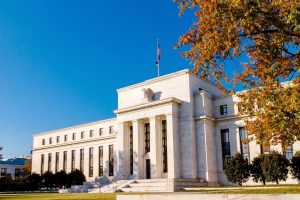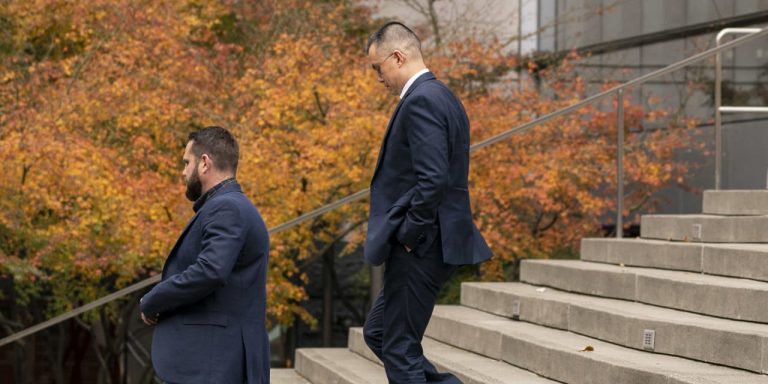Binance CEO Changpeng Zhao, right, leaves federal court in Seattle on Tuesday.
David Ryder/Getty Images
Binance Holdings’ CEO Changpeng Zhao has stepped down from managing the crypto exchange and has pleaded guilty in federal court to anti-money-laundering violations, U.S. law-enforcement officials said on Tuesday.
Binance, which is owned by Zhao, is pleading guilty as well. It has agreed to pay $4.3 billion in fines, including the settlement of civil allegations, under an agreement that also calls for five years of third-party monitoring. Zhao agreed to pay a $50 million fine.
Binance was charged with money laundering violations, conspiracy to conduct an unlicensed money transmitting business, and U.S. sanctions violations.
It was the second case against a major crypto player in a month, after federal prosecutors convicted former FTX CEO Sam Bankman-Fried on seven counts of fraud, Attorney General Merrick Garland said at a press conference on Tuesday. “The message here should be clear: using new technology to break the law does not make you a disrupter, it makes you a criminal,” he said.
Binance prioritized “growth over compliance” with U.S. laws, conducting billions of dollars in transactions without getting required information on customers or monitoring the transactions, Garland said. This is despite U.S. customers making up a significant portion of its customer base, he said.
Garland said Zhao willfully violated the Bank Secrecy Act. From about August 2017 to October 2022, Binance and Zhao engaged in a “deliberate and calculated” effort to profit in the U.S. without the required controls.
Treasury Secretary Janet Yellen said in prepared remarks that the “result of these agreements will be an end to company behavior that has posed risks to the U.S. financial system, U.S. citizens, and our country’s national security for too long.”
Yellen added that the move also sends “a message to the virtual currency industry more broadly, today and for the future.”
Treasury said Binance allowed illicit actors to make more than 100,000 transactions freely, supporting activities such as child sexual abuse, illegal narcotics, and terrorism, including transactions associated with terrorist groups like Hamas’s Al-Qassam Brigades, Palestinian Islamic Jihad, al Qaeda, and ISIS.
A representative from Binance didn’t immediately answer a request for comment.
In a social media post, Zhao said the decision to step down from the company “was not easy to let go emotionally. But I know it is the right thing to do. I made mistakes, and I must take responsibility. This is best for our community, for Binance, and for myself.”
Zhao said it is unlikely that he would be the CEO of a start-up again, but he emphasized that the company wasn’t accused of misappropriating customer funds or manipulating markets.
The government said that while Binance processed the transactions, it failed to file any suspicious activity reports, as financial institutions are required to do when they see certain potentially problematic transactions. It also allowed more than 1.5 million virtual currency trades that violated U.S. sanctions.
Treasury called it the largest enforcement action in its history, including a $3.4 billion settlement with the Financial Crimes Enforcement Network, and a $1 billion settlement with the Office of Foreign Assets Control.
Under the settlement, Binance has to report the suspicious transactions it has failed to report so far and set up an effective anti-money-laundering program. The settlement agreements subject Binance to increased scrutiny for five years through a third-party monitor.
Zhao said Richard Teng, formerly head of regional markets, was named the new CEO of Binance.
Write to Liz Moyer at [email protected]
Read the full article here









